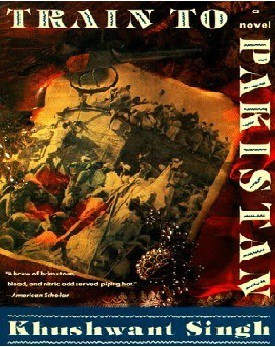Historically, we are all aware of the partition of 1947, the splitting of India and Pakistan, a violent episode that led to the death of millions of people and the displacement of ten million people from their homes. Some of us may have even heard our grandparents talking about the tragic events of that summer.
What Khushwant Singh does in his book, Train to Pakistan, is that he narrates the incident with a story around a small, remote village on the border of India and Pakistan where Muslims and Sikhs resided together in peace for many years. Relatively unaffected by the politic scenario of the country at the time, the villagers had only heard of the gruesome crimes committed on Hindus, Muslims and Sikhs by each other.
Mano Majra is a village were the villagers plan their day’s activities in accordance to the timing of the train that stops at the station nearby. As the reader plods through the novel, this train station turns out to play a crucial role in shaping the climax of the plot. The violence is unleashed early on with the death of the money lender, Lala Ram Lal at the hands of village goons. Shortly afterwards, the badmash Juggut Singh and a social worker from Britain visiting the village, Iqbal are accused of the murder and rounded up by the police. Juggut, or Juggu as he’s referred to, is infamous throughout the village but has been wrongly accused of the crime. Iqbal is a cynical and well educated babu sahib who often voices his thoughts about the flaws in the system and the mentality of the villagers.
While they are still in lock-up, an unscheduled train stops at Mano Majra, full of bodies of dead Sikhs. This train from Pakistan is the first gory event that stems from the Partition that the villagers witness themselves, having hitherto merely heard storied of murder, rape and abduction before. After this incident, mistrust, anger and sorrow divide the otherwise friendly villagers with the Muslims deciding it best to leave for Pakistan. Tension mounts as the Sikhs plan to retaliate by killing off all Muslims in a train to Pakistan, which was also carrying the villagers they’d lived with for many years. Once released, both Iqbal and Juggu are presented with the same opportunity of saving many lives and preventing more bloodshed. Juggu makes for an unlikely hero at the end when he risks all to save the passengers on the train, including Nooran, the girl he loved.
Khushwant Singh narrates the incidents and creates the characters in excruciating detail, thus allowing the reader to visualise. He captures the transition of behaviour and attitude in the characters in a life like manner. The characters, Hukum Chand, the magistrate in particular, are often posed with moral dilemmas and conflicting thoughts. Rather than focusing on the political events, he looks at how they affected common people at the grass root level. He doesn’t condemn any side but rather holds all parties equally responsible for the Partition and the terror it created. Train to Pakistan is a book many have recommended but I had never actually gotten down to reading it. I regret having picked it up so late, for though it is fictional, this book catches human emotions of fear, anger and brutality in a simple yet chilling manner.





Comments are closed.